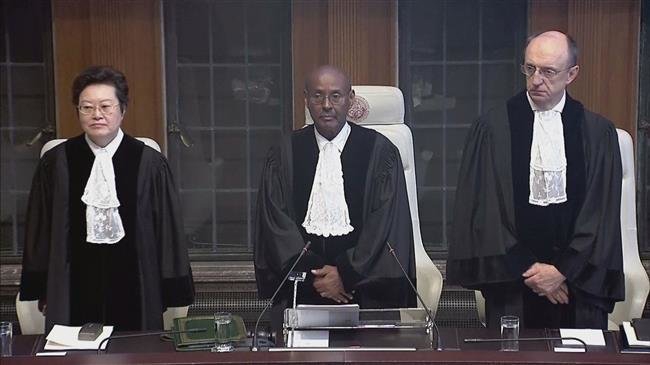Sunday 7 October 2018 - 18:36
Story Code : 322351
Highest UN court verdict: Iran, world community on the same page against US arrogance
On Wednesday (October 3, 2018), the Hague-based court, which is the principal judicial organ of the United Nations, announced its ruling regarding the July lawsuit brought by Tehran against Washington's decision to re-impose unilateral sanctions�after US withdrawal from the 2015 landmark Iran nuclear deal.
In a provisional verdict, the ICJ unanimously ruled that the US government should lift all bans on the free export of humanitarian goods like food and medicine to Iran, saying the US must ensure that the re-imposed sanctions do not impact humanitarian aid or civil aviation safety.
The verdict, which was read out by Judge Abdulqawi Ahmed Yusuf, says:
Washington "shall remove by means of its choosing any impediments arising from the measures announced on May 8 to the free exportation to Iran of medicines and medical devices, food and agricultural commodities" as well as airplane parts.
The decisions of the ICJ, which rules on disputes between UN member states, are legally binding and cannot be appealed.
As expected, both Secretary of State Mike Pompeo and National Security Advisor John Bolton not only questioned the court�s �jurisdiction� but also announced Washington�s pull out of the 1955 treaty of Amity.
The latest withdrawal by Washington from multilateral accords
Shortly after the ICJ announcement, the Trump administration pulled out of two international agreements following Iran and the Palestinians complained to the International Court of Justice about US policies.
On the same day, John Bolton, the US national security adviser, dismissed the UN�s top tribunal as �politicized and ineffective� as he announced that the United States would review all international agreements that could expose it to binding decisions by the ICJ.
Tehran had argued that the US sanctions�re-imposed since May by Washington violated the terms their 1955 Treaty of Amity. The Trump administration responded by exit from the treaty, an agreement that was signed long before Iran�s 1979 Islamic Revolution.
The irony of Pompeo�s speech�
At the United Against Nuclear Iran Summit 2018 last week,�Secretary of State Mike Pompeo said,��It [Iran] has no regard for international law, borders or lives. It is therefore incumbent on every country to join our efforts to change the regime�s lawless behaviour.�
But just�a few days after uttering those words, Pompeo declared Washington is canceling a 1955 treaty with Tehran after the International Court of Justice ruling�against the anti-Iran US sanctions, noting:
�I�m announcing that the United States is terminating the 1955 Treaty of Amity with Iran, this is a decision that is 39 years overdue."
Now, which of these two countries has no regard for international law?�Mr.�Pompeo needs to think twice about his words.
"Trump no reliable negotiating partner after ending Amity Treaty"
In an interview with Qatar-based broadcaster Al Jazeera in New York which released on Friday (October 5), Iran's�Foreign Minister Mohammad Javad Zarif stated that the United States has once again proved that it is not a "reliable negotiating partner" by pulling out of a decades-old treaty with Iran, stressing that US President Donald Trump is not bound by any negotiated settlement.
The top Iranian diplomat said:
"They [the US] were always saying that we want a treaty with Iran. Now they just withdrew from the [1955 Treaty of Amity] that we have with the United States because the International Court of Justice ruled against the."
ICJ ruling adds to the US Isolation
An expert wrote for�LobeLog�that although theoretically �binding,� the court�s order sadly lacks the necessary teeth to compel U.S. compliance. At the same time, however, it offers compelling moral and ethical authority that adds to the isolation that Washington faces on its Iran policy. It will likely energize efforts to protect the Iran deal despite Washington�s exit, particularly in light of the considerable progress made recently by the other signatories toward establishing a special mechanism to continue trade with Iran by bypassing the dollar and the U.S. financial system.
Multilateralism in danger
There have been mounting concerns among US allies over the Trump administration�s loyalty or better to say disloylty to multilateralism.
It should be noted that during the nearly two years since being elected, Donald Trump has withdrawn the United States from a nuclear accord between world powers and Iran, pulled out of a global climate accord, left the UN cultural agency, and threatened NATO military allies that the United States would �go its own way� if members did not spend more on defense.
# Tags











